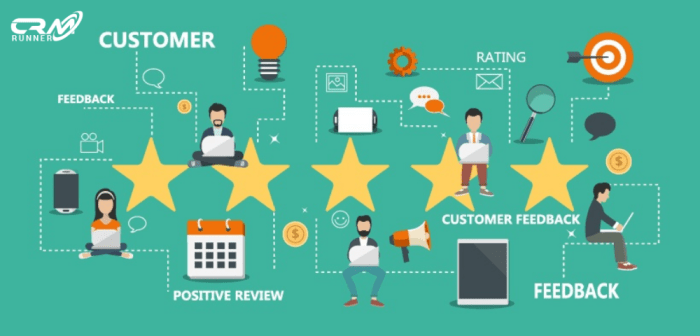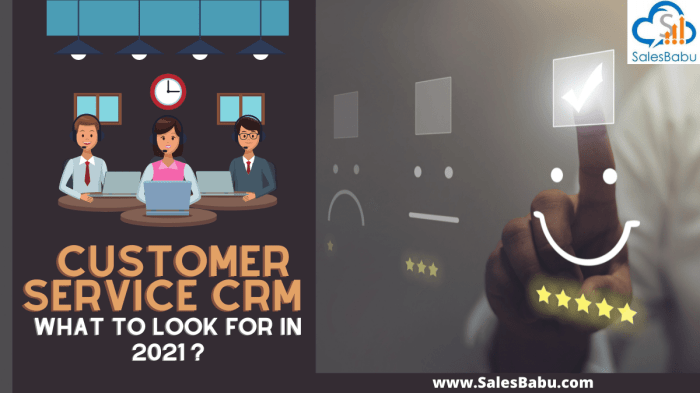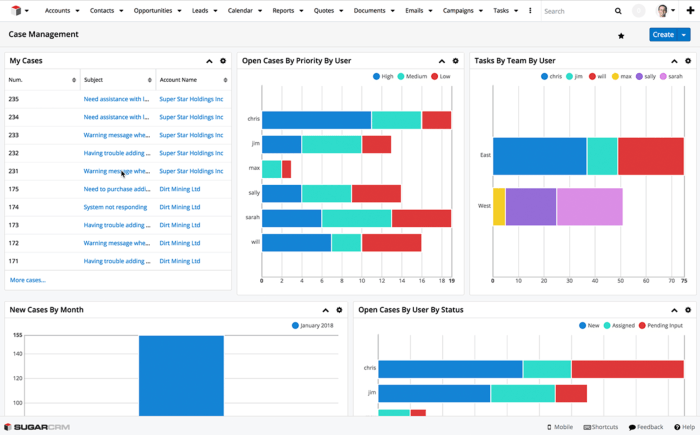CRM software for customer service is revolutionizing how businesses interact with their clients. Efficiently managing customer interactions, from initial contact to post-sale support, is crucial for success in today’s competitive market. This powerful technology streamlines processes, improves response times, and fosters stronger customer relationships, ultimately boosting loyalty and revenue. Understanding the capabilities and applications of CRM software is essential for any organization aiming to provide exceptional customer service.
Effective CRM systems offer a centralized hub for all customer data, allowing support teams to access comprehensive information quickly. This includes purchase history, communication logs, and support tickets, enabling personalized and efficient service. Furthermore, features like automated workflows, reporting dashboards, and integrated communication channels enhance productivity and allow for proactive customer engagement, addressing potential issues before they escalate.
In today’s competitive landscape, providing exceptional customer service is paramount to success. Customer Relationship Management (CRM) software has evolved from a simple contact database to a powerful suite of tools designed to streamline operations, enhance customer interactions, and ultimately boost profitability. This comprehensive guide delves into the world of CRM software specifically tailored for customer service, exploring its features, benefits, and how to choose the right solution for your business needs.

Source: crmrunner.com
Understanding the Role of CRM in Customer Service
CRM software acts as a central hub for all customer-related information, providing a 360-degree view of each individual. This holistic perspective empowers customer service teams to personalize interactions, anticipate needs, and resolve issues efficiently. Key functionalities directly impacting customer service include:

Source: salesbabu.com
Key Features of CRM for Customer Service, Crm software for customer service
- Ticketing System: A centralized system for managing customer inquiries, complaints, and requests. Features often include automated routing, priority assignment, and status tracking, improving response times and ensuring no query falls through the cracks. This is crucial for efficient customer service case management .
- Knowledge Base: A repository of self-service resources, including FAQs, articles, and video tutorials, empowering customers to find solutions independently. This reduces the burden on customer service agents and improves customer satisfaction by offering immediate answers. A well-structured knowledge base is a cornerstone of proactive customer service .
- Live Chat & Messaging: Real-time communication channels enabling instant interaction with customers. These tools provide immediate support and enhance customer engagement. Integration with the CRM ensures seamless context sharing and efficient issue resolution. This is especially important for omnichannel customer service .
- Call Center Integration: Seamless integration with phone systems allows agents to access customer information during calls, personalize interactions, and efficiently manage calls. This enhances agent productivity and improves customer experience. This is vital for efficient call center management .
- Reporting & Analytics: Comprehensive reporting and analytics dashboards provide insights into customer service performance, including key metrics such as average resolution time, customer satisfaction (CSAT), and Net Promoter Score (NPS). This data-driven approach enables continuous improvement and optimization of customer service strategies. This helps with measuring customer service effectiveness .
- Automation & Workflow: Automating repetitive tasks such as email responses, follow-ups, and survey distribution frees up agents to focus on complex issues and high-value interactions. Workflow automation ensures consistent service delivery and reduces errors. This relates to automated customer service workflows .
Benefits of Implementing CRM for Customer Service
The advantages of using CRM software for customer service are numerous and impactful:
- Improved Customer Satisfaction: Personalized interactions, faster response times, and efficient issue resolution lead to higher customer satisfaction and loyalty.
- Increased Efficiency & Productivity: Automation, streamlined workflows, and easy access to customer information empower agents to handle more inquiries efficiently.
- Reduced Costs: Improved efficiency, reduced errors, and increased self-service capabilities contribute to lower operational costs.
- Enhanced Agent Performance: Access to comprehensive customer information and streamlined tools improve agent knowledge and performance.
- Better Data-Driven Decision Making: Comprehensive reporting and analytics provide insights for optimizing customer service strategies and improving overall performance.
- Improved First Contact Resolution (FCR): Quick access to information and efficient processes enable agents to resolve issues on the first contact, improving customer experience.
- Stronger Customer Relationships: Personalized interactions and proactive communication foster stronger customer relationships and loyalty.
Choosing the Right CRM Software for Your Business
Selecting the right CRM software depends on various factors, including business size, budget, specific needs, and existing infrastructure. Consider these key aspects:
- Scalability: Choose a solution that can grow with your business, accommodating increasing customer volume and evolving needs.
- Integration Capabilities: Ensure seamless integration with existing systems, such as your email marketing platform, help desk software, and e-commerce platform.
- User-Friendliness: Opt for a system that is intuitive and easy to use for both agents and administrators.
- Customization Options: Choose a CRM that allows for customization to meet your specific business requirements and workflows.
- Pricing & Support: Consider the cost of the software, including licensing fees, implementation costs, and ongoing support.
- Security & Compliance: Ensure the CRM provider adheres to relevant data security and privacy regulations.
Popular CRM Software Options for Customer Service
The market offers a wide array of CRM solutions. Some popular options include Salesforce Service Cloud, Zendesk, HubSpot Service Hub, Freshdesk, and Zoho CRM. Each platform offers unique features and functionalities, catering to different business sizes and needs. Thorough research and comparison are crucial before making a decision.
Frequently Asked Questions (FAQ)
- Q: What is the average cost of CRM software for customer service? A: The cost varies significantly depending on the chosen platform, features, number of users, and customization needs. Expect a range from free options with limited features to enterprise-level solutions costing thousands of dollars per month.
- Q: How long does it take to implement CRM software? A: Implementation time varies depending on the complexity of the system and the size of your business. It can range from a few weeks to several months.
- Q: What are the key metrics to track in a CRM for customer service? A: Key metrics include average handling time (AHT), first contact resolution (FCR), customer satisfaction (CSAT), Net Promoter Score (NPS), and ticket resolution time.
- Q: Can CRM software integrate with my existing systems? A: Most modern CRM platforms offer robust integration capabilities with various third-party applications, including email marketing platforms, help desk software, and e-commerce platforms.
- Q: What are the benefits of using a cloud-based CRM? A: Cloud-based CRMs offer scalability, accessibility from anywhere, automatic updates, and reduced IT infrastructure costs.
Conclusion
Implementing the right CRM software is a strategic investment that can significantly enhance your customer service operations. By providing a centralized hub for customer information, streamlining workflows, and empowering agents with the right tools, CRM software enables businesses to deliver exceptional customer experiences, foster loyalty, and drive growth. Careful consideration of your specific needs and a thorough evaluation of available options will ensure you select the solution that best fits your business.
Call to Action
Ready to transform your customer service? Explore the leading CRM platforms today and discover how the right solution can elevate your customer interactions and drive business success. Contact us for a free consultation to determine the best CRM fit for your organization.
In conclusion, implementing the right CRM software for customer service can significantly transform a business’s approach to customer interactions. By centralizing information, automating tasks, and providing insightful analytics, CRM systems empower businesses to deliver superior customer experiences, leading to increased satisfaction, loyalty, and ultimately, profitability. The investment in a well-chosen CRM system is an investment in the long-term success and growth of the organization.
Frequently Asked Questions: Crm Software For Customer Service
What are the key features to look for in CRM software for customer service?
Key features include robust ticketing systems, integrated communication channels (email, phone, chat), customizable workflows, reporting and analytics dashboards, and seamless integration with other business tools.
How much does CRM software typically cost?
Pricing varies widely depending on the features, scalability, and vendor. Options range from affordable cloud-based solutions to more expensive enterprise-level systems. It’s essential to carefully evaluate your needs and budget before selecting a provider.
Effective CRM software is crucial for excellent customer service, streamlining interactions and improving overall satisfaction. However, the needs of a customer-facing business differ from those of a contracting company; for contractors, specialized software is often necessary, such as the systems detailed at crm software for contractors. Ultimately, choosing the right CRM, whether for customer service or project management, hinges on understanding your specific operational requirements.
How long does it take to implement CRM software?

Source: imgix.net
Implementation time depends on the complexity of the system and the size of the organization. Smaller businesses might see results within weeks, while larger enterprises may require months for complete integration and training.
What are the potential challenges of implementing CRM software?
Challenges include data migration, user adoption, integration with existing systems, and the need for ongoing training and support. Careful planning and change management are crucial for successful implementation.
